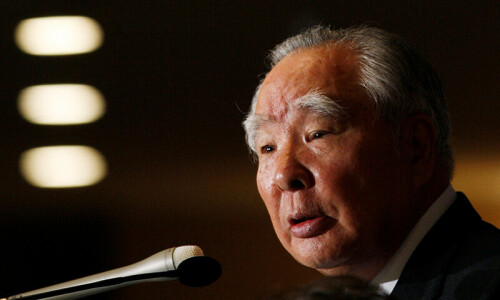The China-Pakistan Economic Corridor (CPEC) will benefit Pakistan as well as China in several dimensions, but the investments in infrastructure need to be sped up, economic experts and analysts told attendees of the two-day CPEC Summit in Karachi, jointly organised by the Dawn Media Group and the Ministry of Planning and Development.
Dr Nadeem Javed, an expert on economic policy, noted that energy investments under the corridor clock in at almost $34 billion.
"The energy sector has already started experiencing improvements in the shape of reduction in unit costs," he said. Thanks to all the spending, the efficiency factor in the energy sector could be increased by 41 per cent, he added.
"Given that around $190bn worth of merchandise will pass through Pakistan under CPEC, the corridor will help Pakistan generate huge [tax] revenues," he later remarked. The corridor will also improve regional connectivity, he said.
"Apart from the energy and infrastructure sectors, CPEC will also benefit the industrial sector," the analyst commented. "Pakistan will become a favourite destination for investments, whereas jobs will also be relocated from other countries in the region to Pakistan," he added.
Shoaib Siddiqui, federal secretary to the Ministry of Planning, noted that the proportion of the workforce on CPEC projects is in favour of Pakistan.
"Two-thirds of the workforce on CPEC projects is Pakistani, compared to one-third Chinese nationals. So we need to understand that this is benefiting us," he said.
The top planning official also hinted at a new system of interaction with Chinese officials. "China-Pakistan relations are not based on unnecessary litigation," he said.
Tang Hao, vice president of the China State Construction Engineering Corporation (CSCEC), said that the economic and social benefits of the corridor will be visible within the next few years. "We will also train Pakistani engineers and technicians," he promised.
He thanked the government and the army for their cooperation.
He thanked Planning Minister Ahsan Iqbal in particular, noting that the minister had extended the visas granted to more than 300 Chinese workers in Pakistan "so they could concentrate on their work here instead of having to return to China for the sole reason of renewing their visas."
Businessman Arif Habib termed the corridor "a win-win situation for both Pakistan and China". However, "Pakistan needs much more in order to make up for infrastructure shortages," he said at one point.
"I am disappointed that only around $4.5 billion have been invested in infrastructure development so far. I am also disappointed at the lack of coordination between stakeholders and policymakers," he said while stressing the need for improvement in dealing with the multi-billion project.
According to him, CPEC projects, after completion, would add 2 percentage points to GDP growth. He also noted that the ongoing construction of CPEC projects has already increased the demand for cement, steel and other construction materials.
Talking about risks to Pakistan, he said that the country must ensure that the quality of machinery and supplies being imported is of international standard. He further recommended that the State Bank give quick approvals for repayments etc, so that more Chinese interested in providing loans can lend money.
"Chinese banks are taking an interest in financing projects in Pakistan. Other banks are also interested in investing in the country," he noted.
China Railways Construction Company General Manager Wang Lei, on the other hand, stressed the need for an improvement in the infrastructure and power sectors.
"Industries need to be upgraded too. They are at least 30 years behind in terms of technology and machinery," he added.
"Pakistan is portrayed as a dangerous state [in international media]. The media should change itself or be changed," he suggested. "News of a bad security situation scares investors."
He also made a few observations regarding Pakistani society.
The official also talked on Pakistan's political instability. He noted that no prime minister in the country has ever completed their term.
"The judicial system is also very different from China — courts take forever to decide cases [here]," he noted. "We can learn a lot from each other."
Senior researcher Hassan Khawar shed light on the trade disparities between the two countries, noting that Pakistani businessmen pay 60pc duties on some products, as opposed to 20pc by other countries.
"For Pakistan, the main incentive in CPEC is economic growth," he stressed.
Former State Bank of Pakistan governor Mohammad Yaseen Anwar, in his speech, stressed the need to address the problems of urbanisation, agriculture and power shortages.













































